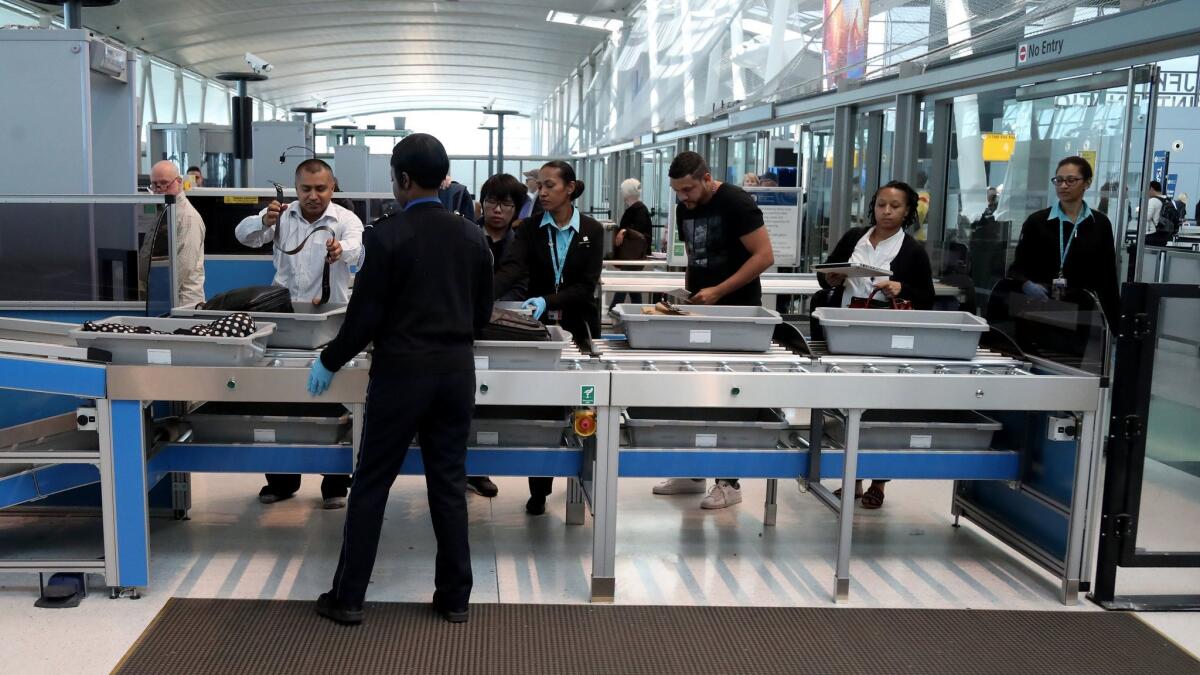Editorial: A TSA agent who may have lied about a bomb threat can’t be sued? That’s appalling

- Share via
In 1965, narcotics agents burst into the home of Webster Bivens without a warrant, manacled him in front of his family, threatened to arrest his wife and children and marched him off to the Brooklyn courthouse. Six years later, the lawsuit Bivens brought reached the Supreme Court, which ruled for the first time that agents of the federal government could be sued personally for damages if they violated a citizen’s constitutional rights, even if Congress hadn’t explicitly authorized such lawsuits.
That case, Bivens vs. Six Unknown Federal Narcotics Agents, may sound like a landmark decision, and so it seemed at the time. But over the years, the courts have found one excuse after another to ignore its central insight: that if there is a violation of the Constitution, there must also be a remedy.
The most recent example of judicial abdication is a federal appeals court decision protecting a Transportation Security Administration employee who accused a traveler of making a bomb threat — a charge that a judge later found to be baseless — after the man complained about disrespectful treatment during a security screening.
The traveler, an architect named Roger Vanderklok, was preparing to fly from Philadelphia International Airport to Miami in 2013 to participate in a half-marathon. Because his carry-on luggage contained an electronic heart monitor enclosed in a plastic tube, Vanderklok was subjected to a secondary screening supervised by TSA employee Charles Kieser. According to Vanderklok, after he threatened to file a complaint against Kieser for disrespectful and aggressive behavior, the TSA employee called the police and claimed that Vanderklok had suggested that he could bring a bomb to the airport and “you would never find it.”
TSA employees should be afraid that such egregious misbehavior will land them in court.
Vanderklok was arrested and charged with disorderly conduct, “threatening the placement of a bomb” and “terroristic threats.” But he was acquitted when Kieser’s testimony was contradicted by surveillance footage.
Vanderklok then sued Kieser for, among other things, violating his 1st Amendment rights by retaliating against him for saying that he would file a complaint. But the U.S. 3rd Circuit Court of Appeals this week ruled that a 1st Amendment claim against a TSA employee couldn’t even be brought. (Aggravating the injustice, the court suggested that Vanderklok would probably be “out of luck” if he sued the TSA itself rather than Kieser as an individual.)
Writing for the three-judge panel, Judge Kent A. Jordan held that a “special factor” argues for protecting TSA employees from lawsuits. What is that “special factor”? Essentially, it’s all about 9/11. Jordan argues that the court couldn’t consider Vanderklok’s claims without second-guessing “the government’s whole response to the Sept. 11 attacks, thus of necessity requiring an inquiry into sensitive issues of national security.”
Jordan’s language about 9/11 and “sensitive issues of national security” was a quotation from a decision handed down by the Supreme Court in June called Ziglar vs. Abbasi. In that ruling, the court held that a group of mostly Muslim men held in harsh conditions after 9/11 couldn’t sue government officials, including former Atty. Gen. John Ashcroft and former FBI director Robert S. Mueller III. The court was concerned that allowing the lawsuit to go forward might chill senior government officials as they engaged in national security decisions.
Even if one shares that concern about a chilling effect on policymakers — and we think it is overstated — it’s absurd to discern a similar “special factor” in the mundane duties of TSA employees. Yet Jordan tries to make such a connection, saying that a “threat of damages liability could indeed increase the probability that a TSA agent would hesitate in making split-second decisions about suspicious passengers.”
That hypothetical doesn’t come close to the facts of the appeal Jordan was deciding. The TSA employee in this case was being sued not on claims of overzealousness in searching for weapons but of fabricating a story that caused a traveler to face criminal charges, just because the traveler had accused him of rudeness. TSA employees should be afraid that such egregious misbehavior will land them in court.
Appalling as the decision in this case is, it’s consistent with a larger trend of undermining the promise the Supreme Court made in the Bivens case: that federal agents who violated constitutional rights could be sued for damages. In its decision in June, the court admitted that it had developed second thoughts about its decision to authorize such suits on its own authority.
In the majority opinion, Justice Anthony Kennedy wrote: “The question is who should decide whether to provide for a damages remedy, Congress or the courts? The answer most often will be Congress.”
If that’s going to be the court’s attitude, then Congress must act to ensure that when federal officials, high or low, violate the Constitution, those they harm can seek justice.
Follow the Opinion section on Twitter @latimesopinion and Facebook
More to Read
A cure for the common opinion
Get thought-provoking perspectives with our weekly newsletter.
You may occasionally receive promotional content from the Los Angeles Times.









